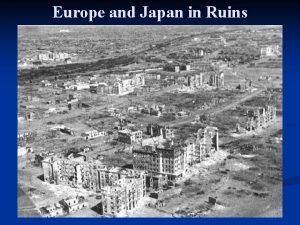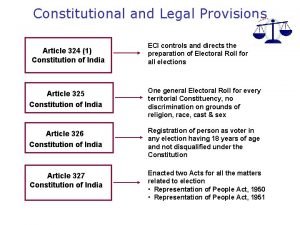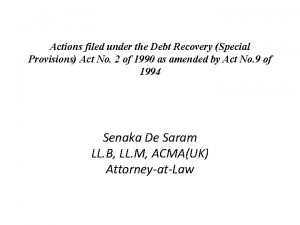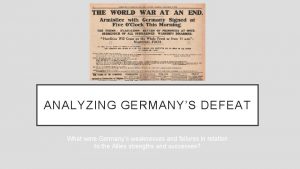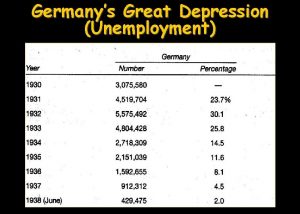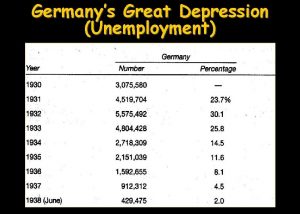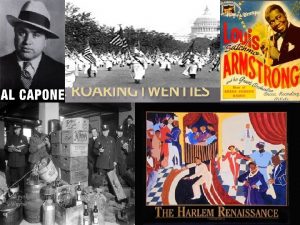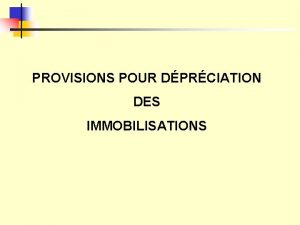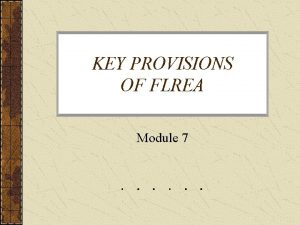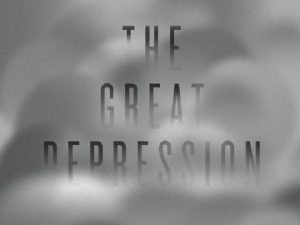Germanys Provisions Post WWI Europe after the Great




















- Slides: 20

Germany’s Provisions Post WWI


Europe after the Great War

Social Changes of the 1920 s • Class distinctions faded away as role of aristocracy declined • Government expansion led to expansion of “white-collar” jobs • Advancements in technology prevented growth of working class • Women earned the right to vote

Scientific Revolution • Albert Einstein and Werner Heisenberg challenged traditional ideas of the universe • “Truth was merely a set of mental constructs” • Atomic world replaces classical world • Sigmund Freud • Psychoanalysis was the key to understanding human behavior

Artistic Revolution Race Horses by Degas • Literature • Ernest Hemmingway • John Steinbeck • F. Scott Fitzgerald • Art • Edgar Degas • Pablo Picasso • Salvador Dali The Persistence of Memory by Dali Les Demoiselles d’ Avignon by Picasso

German Hyperinflation • German economy collapsed in 1923 • Loss of territory as part of Treaty of Versailles • Hyper-inflation

Pictures of Hyperinflation What can you do with German money in 1923? Make a fort (above) or burn it for heat (right)

The Dawes Plan • U. S. plan to reorganize the German economy • Lower annual war reparations payments • German currency reorganized • U. S. loans to Germany • Stabilizes the German economy • 1924 -1929 sees a return to relative economic prosperity

The Dawes Plan High-interest Loans United States Germany Interest on War Debts War Reparations Allies

THE GREAT DEPRESSION

Causes of the Great Depression • Agricultural Depression • Decline in wheat prices • “Dust Bowl” • Bank Failures • Overproduction of Goods • Production grew by 50%; wages increased at slower rate • Credit • Buying goods (including stock) on margin

Effects of the Great Depression • Decline of world trade • Countries turn to economic nationalism • Massive unemployment • German unemployment 40% • Global decline in industrial production • German production declines by 30%; France 20% • Poverty and hunger widespread • Starvation in Germany

Reactions to the Depression • Government Changes • Welfare State • The New Deal • Keynesian Economics • Political Radicalization • Rise of communist and fascist parties • Germany and Japan turn to state controlled economic growth

TOTALITARIANISM AND MASS MOBILIZATION

Characteristics of Totalitarianism • Attack liberal democracy and capitalism • State directed economy • State more important than the individual • Charismatic dictators • Depend upon mobilization of the masses • Embrace public welfare programs • Use censorship and propaganda • Women not permitted a public role

Rise of Adolf Hitler • Born in Austria • High school dropout • Served in World War I • Arrested for role in Beer Hall Putsch • Writes Mein Kampf from prison • Became chancellor of Germany in 1933

Reforms of Adolf Hitler • Ignores provisions of the Treaty of Versailles • Ends war reparations payments • Uses militarization to ease the burdens of the Great Depression • Many countries sympathized with Germany • Nazis seize complete political control • Beginning of the Holocaust • Nuremburg Laws (1935)


 After me after me after me
After me after me after me If any man comes after me
If any man comes after me Indot utility coordination
Indot utility coordination Three political problems postwar governments faced
Three political problems postwar governments faced Legal provisions
Legal provisions Caltrans standard specifications 2015
Caltrans standard specifications 2015 Life insurance contractual provisions
Life insurance contractual provisions Define decree nisi
Define decree nisi Fidelity personal trust company fee schedule
Fidelity personal trust company fee schedule Fema provisions
Fema provisions New hobbs farm and provisions
New hobbs farm and provisions 2015 nehrp recommended seismic provisions
2015 nehrp recommended seismic provisions Esf+ regulation
Esf+ regulation Life insurance contractual provisions
Life insurance contractual provisions Life insurance contractual provisions
Life insurance contractual provisions Who was the leader of the franks
Who was the leader of the franks Europe after world war 2 map
Europe after world war 2 map What is impressionism and expressionism
What is impressionism and expressionism Is post after the event
Is post after the event Who were the “5 great powers” of europe?
Who were the “5 great powers” of europe? Wwi webquest
Wwi webquest



